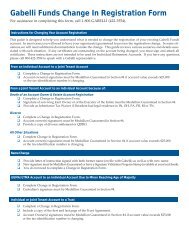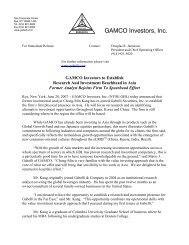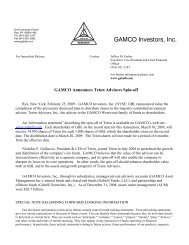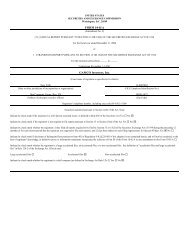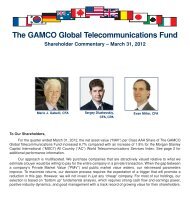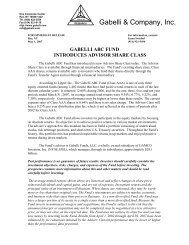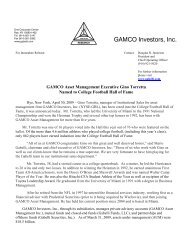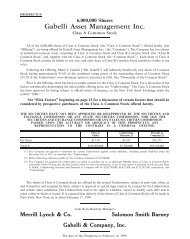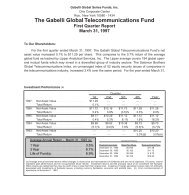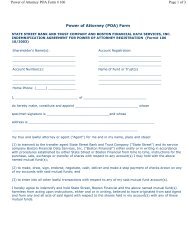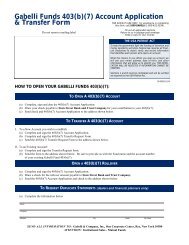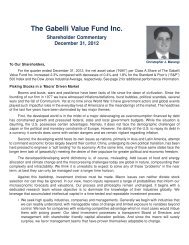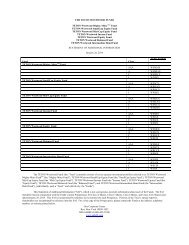LETTER OF TRANSMITTAL GAMCO Investors, Inc. - Gabelli
LETTER OF TRANSMITTAL GAMCO Investors, Inc. - Gabelli
LETTER OF TRANSMITTAL GAMCO Investors, Inc. - Gabelli
Create successful ePaper yourself
Turn your PDF publications into a flip-book with our unique Google optimized e-Paper software.
IMPORTANT TAX INFORMATION<br />
TO ENSURE COMPLIANCE WITH TREASURY DEPARTMENT CIRCULAR 230, YOU ARE<br />
HEREBY NOTIFIED THAT: (I) ANY FEDERAL TAX ADVICE CONTAINED HEREIN IS NOT<br />
INTENDED OR WRITTEN TO BE USED, AND CANNOT BE USED BY ANY TAXPAYER FOR THE<br />
PURPOSE <strong>OF</strong> AVOIDING PENALTIES THAT MAY BE IMPOSED UNDER THE INTERNAL REVENUE<br />
CODE; (II) THE ADVICE IS WRITTEN IN CONNECTION WITH THE PROMOTION OR MARKETING<br />
<strong>OF</strong> THE TRANSACTION OR THE MATTERS ADDRESSED HEREIN; AND (III) THE TAXPAYER<br />
SHOULD SEEK ADVICE BASED ON THE TAXPAYER’S PARTICULAR CIRCUMSTANCES FROM AN<br />
INDEPENDENT TAX ADVISOR.<br />
If payments are to be made to anyone other than the registered holder, or if the payments are to be paid to<br />
anyone other than the person signing this letter or if Debentures not tendered or not accepted for payment are to be<br />
registered in the name of any person other than the registered holder, all transfer taxes (whether imposed on the<br />
registered holder or on any other person) will be payable by the tendering Holder. Payments may not be paid to<br />
such a Holder unless the Holder has provided satisfactory evidence of the payment of any such transfer taxes or an<br />
exemption from such transfer taxes.<br />
To prevent backup withholding, each United States Holder (as defined below) should either (x) provide his, her<br />
or its correct taxpayer identification number (“TIN”) by completing the copy of the IRS Form W-9 attached to this<br />
Letter of Transmittal, certifying that (1) he, she or it is a “United States person” (as defined in section 7701(a)(30) of<br />
the Internal Revenue Code of 1986, as amended (the “Code”)), (2) the TIN provided is correct (or that such U.S.<br />
Holder is awaiting a TIN) and (3) that the United States Holder is exempt from backup withholding because (i) the<br />
Holder has not been notified by the Internal Revenue Service (the “IRS”) that he, she or it is subject to backup<br />
withholding as a result of a failure to report all interest or dividends, or (ii) the IRS has notified the United States<br />
Holder that he, she or it is no longer subject to backup withholding or (y) otherwise establish an exemption. If you<br />
do not provide a completed Form W-9 to the Depositary, backup withholding may begin and continue until you<br />
furnish your TIN. If you do not provide the Depositary with the correct TIN or an adequate basis for exemption,<br />
you may be subject to a $50 penalty imposed by the IRS, and payments may be subject to backup withholding at a<br />
rate of 28%. If withholding results in an overpayment of taxes, a refund may be obtained from the IRS.<br />
To prevent backup withholding, a Non-United States Holder (as defined below) should (i) submit a properly<br />
completed IRS Form W-8BEN or other Form W-8 to the Depositary, certifying under penalties of perjury to the<br />
Holder’s foreign status or (ii) otherwise establish an exemption. IRS Forms W-8 may be obtained from the<br />
Depositary or on the IRS website at www.irs.gov.<br />
Certain Holders (including, among others, corporations) are exempt recipients generally not subject to these<br />
backup withholding requirements. See the enclosed copy of the IRS Form W-9 and Guidelines for Request for<br />
Taxpayer Identification Number on Form W-9. To avoid possible erroneous backup withholding, exempt United<br />
States Holders should complete and return the Form W-9 and check the box marked “Exempt”.<br />
For the purposes of these instructions, a “United States Holder” is (i) an individual who is a citizen or resident<br />
alien of the United States, (ii) a corporation (including an entity taxable as a corporation) created under the laws of<br />
the United States or of any political subdivision thereof, (iii) an estate the income of which is subject to U.S. federal<br />
income tax regardless of its source or (iv) a trust if (a) a court within the United States is able to exercise primary<br />
supervision over the administration of the trust and one or more U.S. persons have the authority to control all<br />
substantial decisions of the trust or (b) the trust has a valid election in effect under applicable Treasury regulations to<br />
be treated as a U.S. person. A “Non-United States Holder” is any Holder (other than a Holder that is, or holds its<br />
Debentures through, a partnership or other pass-through entity) that is not a United States Holder. The U.S. federal<br />
income tax treatment of a partner or other beneficial owner in a partnership or other flow-through entity generally<br />
will depend on the status of the partner and the activities of such partnership. Partners and partnerships (including<br />
beneficial owners of pass-through entities and such entities themselves) should consult their own tax advisors as to<br />
the particular U.S. federal income tax consequences applicable to them.<br />
See the enclosed Instructions for completing Form W-9 for additional information and instructions.<br />
17




